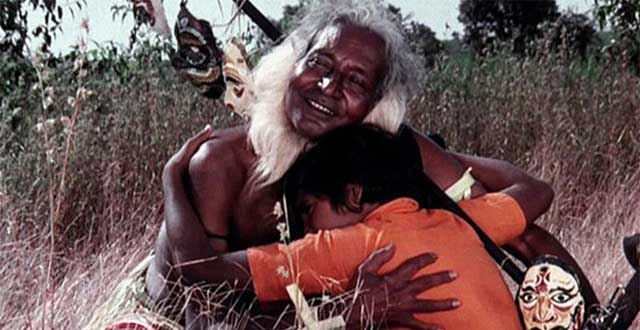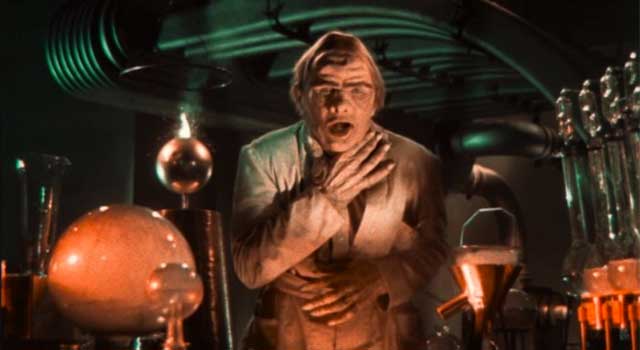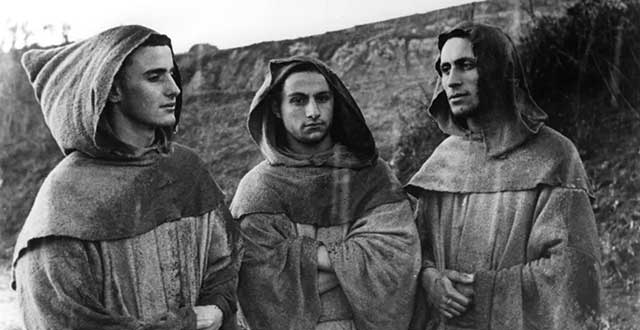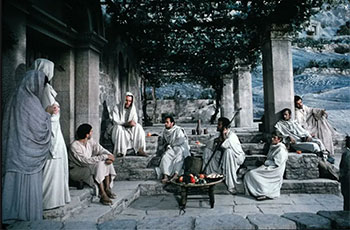News
The Film Foundation, Film Heritage Foundation and Cineteca di Bologna to restore G. Aravindan's KUMMATTY
The Film Foundation’s World Cinema Project, a program created by Martin Scorsese in 2007, Film Heritage Foundation and Cineteca di Bologna are pleased to announce a collaboration to restore legendary Indian filmmaker G. Aravindan’s classic Malayalam film “Kummatty” (1979). The film will be restored at the L’Immagine Ritrovata laboratory in Bologna, Italy and will have its world restoration premiere at the Il Cinema Ritrovato festival in late July.
“I’m thrilled to be working with Shivendra Singh Dungarpur once again to preserve and restore director G. Aravindan’s extraordinary film, ‘Kummatty,’” said TFF founder and chair Martin Scorsese. “Aravindan was a visionary director and ‘Kummatty’ is considered among his greatest work. The Film Foundation’s World Cinema Project will share this film with the wider audience it deserves, making it a true cinematic discovery. Thanks to Olivia Harrison and her Material World Foundation for making this restoration possible.”
“Ever since I first worked with The Film Foundation on the restoration of Uday Shankar’s ‘Kalpana’ (1948) in 2012, I have seen how beautifully and respectfully they have been restoring films from around the world and giving these films a new life,” said Shivendra Singh Dungarpur, Director of the Film Heritage Foundation. “Every time I watch a beautifully restored film, I think of so many landmark films of Indian cinema that are crying out to be preserved, restored and showcased in their original beauty once again to the public to be appreciated. Aravindan’s films have been on the top of the list not just because he is a master, but one who I feel has not gotten the recognition he deserves and whose films sadly are not in circulation. It broke my heart when I learned that all the original camera negatives of his films are lost and all we have are prints, not in the best condition.”
“I was delighted when The Film Foundation’s World Cinema Project agreed to restore ‘Kummatty.’ I travelled to Kollam in Kerala to meet Mr. K. Ravindranathan Nair of General Pictures, the producer of five of Aravindan’s films including ‘Kummatty.’ He very graciously agreed to give permission for the restoration and for us to access the prints from the NFAI. The NFAI gave us both prints for the lab to check the elements. Fortunately, one of the prints did not contain subtitles.”
“‘Kummatty’ is a film that combines poetry, landscape, nature and folk tale through stunning visuals and an unbelievable use of music and sound design. I regard Aravindan as one of the most poetic filmmakers in the world. He is a poet who writes in the language of cinema and silence. Watching his films is like a meditative experience. I am honoured to be a part of this project and we hope to restore his acclaimed film ‘Thampu’ in the near future.”
Cecilia Cenciarelli of Fondazione Cineteca di Bologna said, "Restoring ‘Kummatty’ reminded us once again of the core mission that The Film Foundation and Cineteca di Bologna embrace through the World Cinema Project; to give a new life to masterpieces, shed a light on obscure cinematic gems, and expand the canon of world cinema in multiple directions. Only two 35mm prints (one with photographed English subtitles) of ‘Kummatty’ survive and are the result of a not-so-distant past when film negatives were copied and then discarded, sometimes leaving behind only projection prints. The two copies were naturally worn-out, very dirty and deeply scratched, one containing a consistent vertical green line on the right-hand side of the image, which required painstaking frame-by-frame work to remove.”
“The film's natural environment, which could be considered one of the main characters of the film, was lit by master cinematographer Shaji N. Karun and had completely lost its rich palette that illuminated the skies, grass, foliage and fields, becoming instead a homogeneous magenta. Thanks to Shivendra Singh Dungarpur, L'Immagine Ritrovata laboratory was able to be in contact with G. Aravindan’s son, Ramu Aravindan, and Shaji N. Karun who helped recapture, as much as possible, the original aesthetics as well as the magical dimensions of the film."
About G. Aravindan
Govindan Aravindan was one of India’s greatest filmmakers and a leading light of the New Indian Malayalam cinema of the 1970s and ‘80s. He was a man of many talents – painter, cartoonist, musician, theatre director, and filmmaker. An autodidact, his films were marked by an entirely original approach to cinema. He has been described as a poet-philosopher with a vision, and he made mystical, transcendental films that showed deep compassion for the eccentric, the marginalized, and the alienated. In a career spanning from 1974 to 1991, he made 11 films and 10 documentaries with almost all of his films receiving national or state awards.
KUMMATTY (1979) (English title: THE BOGEYMAN)
Tadao Sato, one of Japan’s foremost film scholars and critics, described “Kummatty” as a masterpiece and stated that he had not seen a more beautiful film in his whole life. The Malayalam film, written and directed by G. Aravindan, was produced by Ravindranathan Nair under the banner of General Pictures.
“Kummatty” tells the story of a Pied Piper-like character of Malabar folklore called Kummatty. Part myth part magician, he’s the bogeyman of a grandmother’s tale who materializes one day mingling with the children and weaving a spell of carefree abandon. He casts a spell and turns the children into animals. One boy, Chindan, is transformed into a dog, but misses the moment when the other children are turned back to human form and has to wait a year for Kummatty to reverse the spell. Chindan’s life as a dog and his return to a human state is a journey through which he realizes that life is a gift and freedom is precious. Kummatty is not an evil spirit summoned to coax children into obedience, but a genial if mysterious companion who transports them into a world of fun and frolic. “Kummatty” won the Kerala State Film Award for the Best Children’s Film in 1979.
THE FILM FOUNDATION
Created in 1990 by Martin Scorsese, The Film Foundation (TFF) is dedicated to protecting and preserving motion picture history. By working in partnership with archives and studios, the foundation has helped to restore over 900 films, which are made accessible to the public through programming at festivals, museums, and educational institutions around the world. TFF’s World Cinema Project, created in 2007, has restored 46 films from 27 different countries, representing the rich diversity of world cinema. The foundation’s free educational curriculum, The Story of Movies, teaches young people – over 10 million to date – about film language and history.
FILM HERITAGE FOUNDATION
Film Heritage Foundation is a not-for-profit organization set up by Shivendra Singh Dungarpur in 2014. It is dedicated to supporting the conservation, preservation, and restoration of the moving image and to developing interdisciplinary programmes to create awareness about the language of cinema. A member of the International Federation of Film Archives (FIAF) since 2015, Film Heritage Foundation is the only non-governmental organization in the country working in the field of film preservation. The advisory council is comprised of such stalwarts as Kamal Haasan, Girish Kasaravalli, Gulzar, Gian Luca Farinelli, Jaya Bachchan, Krzysztof Zanussi, Shyam Benegal, Mark Cousins, and Kumar Shahani.
FONDAZIONE CINETECA DI BOLOGNA
Fondazione Cineteca di Bologna is an internationally recognized FIAF film archive with a multi-faceted mission ranging from film preservation and dissemination, training, research and publishing. In 2007 Cineteca organised the first FIAF Restoration School in Bologna, where it has regularly taken place every other year since then with participants from over 70 countries. Its annual festival Il Cinema Ritrovato is one of the most awaited venues for film historians, scholars and cinephiles all over the world. In the late 1990s, in partnership with the Chaplin Estate, Cineteca began the long process of restoring all of Chaplin’s short, medium and long features – more than 80 titles overall. Over the last 20 years, Cineteca’s laboratory, L’Immagine Ritrovata, has grown to be one of the leading centers for film restoration, with two international branches in Hong-Kong and Paris.
Cineteca di Bologna and L’Immagine Ritrovata have worked in partnership with entities and organizations world-wide, including the Academy Film Archive, Pathé, Gaumont, Sony, Institut Lumière – just to name a few – and completed over 800 restorations, including films by Pasolini, Renoir, Fellini, Visconti, De Sica, Leone, Rossellini, Vigo, Keaton. Cineteca’s long-standing collaboration with The Film Foundation and its World Cinema Project has lead to the restoration of masterpieces from Turkey, Indonesia, Morocco, Egypt, India, Argentina, Kazakhstan, Taiwan, Cuba, Mexico, Senegal, the Philippines and more.
Restoring Doctor X, the First All-Technicolor Horror Feature
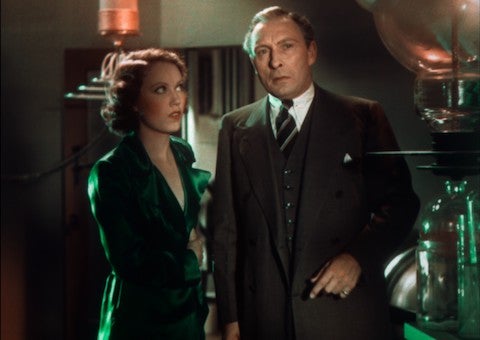
Fay Wray and Lionel Atwill in Doctor X (dir. Michael Curtiz, 1932)
When a rediscovered nitrate Technicolor print of Doctor X (1932) was first restored by the UCLA Film & Television Archive in 1985, then-producer Scott MacQueen detailed this technical achievement in American Cinematographer magazine, writing: “Doctor X has just been resurrected from the only existing color print, allowing general audiences to see this legendary film in its original color for the first time in 53 years. The new print is as accurate as it is compelling.”
Now, in 2021, with Scott MacQueen at the helm of the preservation department, the UCLA Film & Television Archive and The Film Foundation completed a new restoration of Doctor X using digital tools never imagined three decades ago. The landmark horror film—restored in association with Warner Bros. Entertainment Inc. with funding from the Hobson/Lucas Family Foundation—is now available on Blu-ray/DVD thanks to the Warner Archive Collection.
For a closer look at the history of this Technicolor marvel and the recent restoration work, here is an interview with Scott MacQueen:
Do you remember the first time you saw Doctor X?
I was probably about nine years old when it aired on Chiller Theatre on channel 11 in New York. For some reason, I was savvy enough to know even then that it had been shot in color. So, I got my folks to drive me over to my grandparents in Connecticut because they had a color TV set. I parked myself down in front of Chiller Theatre and, to my dismay, it was in black and white! It was many, many years later that I learned the whole history of this film.
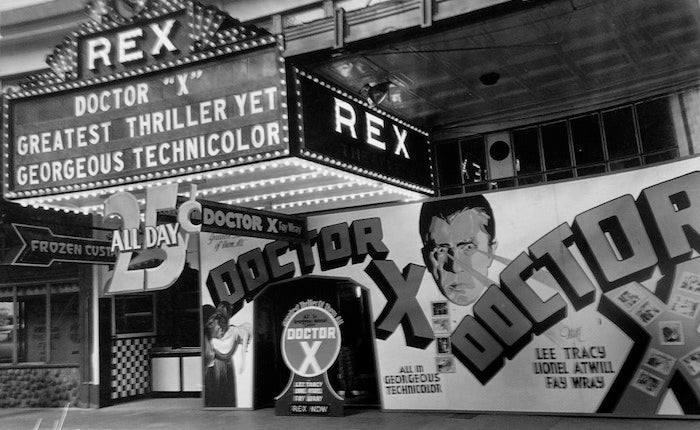
Promotional display for Doctor X at the Rex Theater in Miami, Florida.
How did Doctor X become a “lost” color film?
Doctor X had a couple of strikes against it. It was in the two-color Technicolor process, which was not easily serviceable commercially after three-color Technicolor came in. Then, it had censorship problems, which prevented it from getting a reissue; the Production Code office mainly objected to the theme of cannibalism. As a result, there was no commercial incentive to save the color negative and it disappeared. However, the black-and-white negative survived and was made into 16mm prints for TV syndication in the mid-1950s.
It wasn’t until about 1969, when the nitrate Technicolor print was uncovered in studio mogul Jack Warner's personal vault, that Doctor X existed again in color.
Doctor X was a landmark work as the first horror feature made entirely in color. What other contributions did it make to the genre?
In terms of its color, the film made innovative use of specialty lighting. It saves its red and orange colors for its climactic scenes, like when the mad Moon Killer “creates” himself with globs of “synthetic flesh.” In another scene where Fay Wray finds her father in the makeshift morgue after the first laboratory murder and they realize that the dead body has been cannibalized, the entire scene is saturated in solid green. Green lighting is traditionally a horror color; it’s the antithesis of warm colors, it’s unreal.
The film also brought to the Hollywood horror genre the idea of the serial killer, which is now the most common trope in modern horror films—think of Hannibal Lecter. The American love affair with the serial killer began with Doctor X.
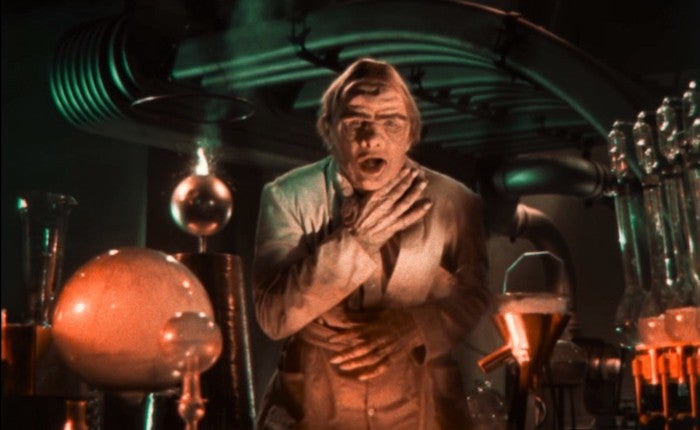
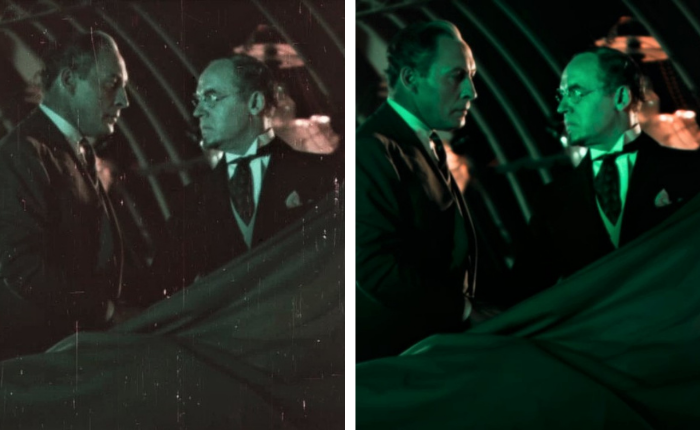
Above: the revealed "Moon Killer." Below: a scene with Lionel Atwill and John Wray before and after restoration work.
Images courtesy of Warner Bros. Home Entertainment.
Why did Warner Bros. also create a black-and-white version of the film?
When I was doing research at the Warner Bros. Archives at USC in 1988, I learned that they had two cameras on set and shot it twice, in color and in black and white. There was a great memo in there from Herbert Kalmus, the president of Technicolor, to Jack Warner. Basically, he was really ticked off when he found out that they were shooting a black-and-white negative of Doctor X. At the time, Warner Bros. had a contract with Technicolor and was eager to end the commitment. Jack Warner’s idea was to make a Technicolor negative of Doctor X, thus fulfilling the contract, while producing black-and-white release prints in their own lab to save money. The Technicolor company caught wind of that right away.
Doctor X was actually very well received in color. In the trade papers, exhibitors reported that the color version was a sensation and made a big difference in their box office numbers. The black-and-white version was mainly distributed in Europe. Why didn’t Jack Warner recognize the money-making potential of the color version? Possibly because he didn’t like horror movies in the first place and the studio didn't have a history of making them.
What were you and our restoration partners able to accomplish with today's digital tools, not possible in 1985?
We went back to the original nitrate print and did 4K scans. We were able to achieve precise color separation, so we could manipulate and balance the colors more carefully, for example: bringing back the soft grey of a felt hat, the neutral color on a topcoat, or getting rid of accrued staining and contamination of the dyes. Those are things that could not be done without digital tools. We were also able to get rid of scratches, paint out bad splices, repair tears and erase the projectionist’s multiple hand-slashed changeover cues. One of the more dramatic differences is seen in the scene where the butler and the maid are going down the stairs in the laboratory, when the reel changeover happens (illustrated in the video below).
We were also able to accomplish a different level of sound restoration. We got rid of multiple hums of camera noise, a high level of optical noise, clicks and pops and things. After not having seen it in color for so long, and then the compromised 1985 color copy, it’s great to see the corrected version looking so rich and vivid. It’s a truly different experience now to see what the Technicolor process could actually do. Its triumph of color design and cinematography now comes front and center.
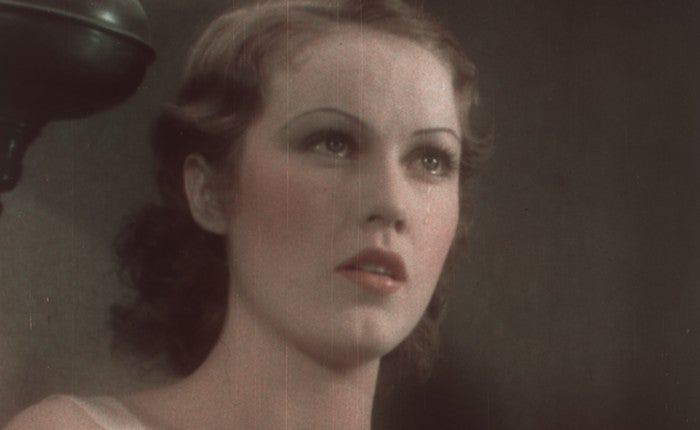
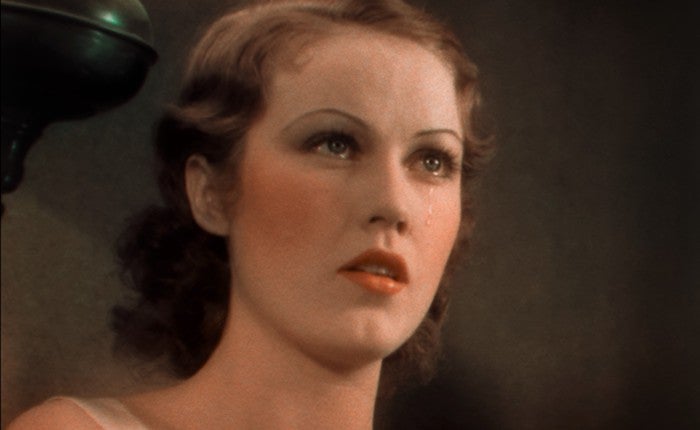
Closeup of Fay Wray before and after restoration work.
Further reading
Ghastly Grinning: Doctor X (1932) Coming to Home Video: Interview with Scott MacQueen
Archive Blog: Mystery of the Wax Museum, Restored: Q&A with Scott MacQueen
—edited by Jennifer Rhee, Digital Content Manager
Oscar Micheaux Finally Premieres at Cannes, 70 Years After His Death
Eric Kohn
Historians may now acknowledge Oscar Micheaux as a pioneering Black filmmaker, and the industry could be catching up. However, that acclaim certainly didn’t follow him through his lifetime, when the hustling novelist and director made complex dramas about Black life in America across three decades, starting with the silent era and continuing for many years after that. By the time of his death in 1951, the child of former slaves in Kentucky had written six novels and directed 44 films, but around 80 percent of them have been lost.
Needless to say, most people have been late to the party when it comes to Micheaux’s career, including Cannes. But the festival’s Cannes Classics sidebar made up for that this year by screening a new restoration of Micheaux’s 1935 crime thriller “Murder in Harlem,” alongside a new documentary about the filmmaker’s contemporary resonance, “Oscar Micheaux – The Superhero of Black Cinema,” directed by Francesco Zippel. The double bill marked the seventieth anniversary of Micheaux’s death as interest in his career has started to rise.
Italy’s Cineteca di Bologna and Martin Scorsese’s The Film Foundation, and the George Eastman Museum produced the 4k restoration of “Murder in Harlem,” which adapts the real-life events from Georgia in 1913 when a Black man when was falsely accused of a murder actually committed by a white man. While lesser known than Micheaux’s most celebrated works, 1920’s “Within Our Gates” and the striking 1925 Paul Robeson drama “Body and Soul,” it contains one of the boldest moments in the filmmaker’s career: When a nightwatchman discovers the corpse of a white woman in the first scene, he gazes directly into the camera, as the terror on his face reflects his awareness that he’ll be accused of the crime.
It’s a stunning window into the constant fear of racial assault that surrounded Micheaux’s era, and one of several key scenes singled out in Zippel’s documentary, which Cineteca di Bologna co-produced with Sky. (No U.S. distribution plans have been announced.) The new movie takes a modern approach to Micheaux’s legacy, assembling a wide range of talking heads to discuss his contemporary resonance while recapping his rocky career. Historians such as the Academy’s Jacqueline Stewart and biographer Patrick McGilligan outline Micheaux’s journey from Kentucky to Iowa and around the country, as he launched an ambitious DIY effort to sell his novels door to door.
That eventually landed him his first directing gig, to adapt his own “The Homesteader,” and he spent much of his career overseeing the releases of the projects to come. The movie also turns to contemporary filmmakers for insight, including Amma Asante, Kevin Willmott, and the late John Singleton. Collectively, they analyze Micheaux’s distinctive ability to explore Black life in America through an unfiltered lens, providing a repudiation of the racist sentiments emboldened by the success of D.W. Griffith’s “The Birth of a Nation.” Ample footage from Micheaux’s work compliments this analysis: “Within Our Gates” features a harrowing sequence in which a young boy’s parents are lynched by a white mob as the boy escapes just in time. That tension between white and Black establishments continued to percolate throughout the Micheaux movies to come, and the documentary makes the case for many of them.
Film scholar Richard Peña pushes back on assessments that Micheaux was an unskilled director, arguing instead that he was “playing with form,” and much of the footage supports this perspective. Others, including musician Chuck D. and The Old Vic’s Kwame Kwei-Armah, explore the cultural value of Micheaux’s story, in particular the way his “pull yourself up by your bootstraps” philosophy enabled him to succeed in an industry that was rigged against Black artists from the start. The documentary shows how while Micheaux’s legacy faded in the much louder call for policy reforms in the Civil Rights era, his artistry continues to inspire future generations. “I think you can draw a direct line from an Oscar Micheaux to a Spike Lee to a Sam Pollard to a Shaka King,” one subject says.
Only five pictures of Micheaux have been uncovered from throughout his life, but “Oscar Micheaux – The Superhero of Black Cinema” also includes some remarkable behind-the-scenes footage of the filmmaker directing in the 1920s, fully in command of his actors as he gestures from beside the camera. Though Micheaux expert McGilligan says that Micheaux’s career is “the greatest American story that nobody knows anything about,” the existence of this tribute and restoration means that could change, and soon.
NOTES ON FILM & RESTORATION
When Roberto Rossellini was making his film Francesco, Giullare di Dio, he cast non-actors in every role (with the exception of Aldo Fabrizi as the invader Nicolaio). Francis and his followers were all played by Franciscan friars and novices, one of whom told Rossellini that he was a poet. “I asked him what kind of poetry he was doing,” said Rossellini in a 1971 Film Culture interview, quoted in Tag Gallagher’s definitive critical biography, The Adventures of Roberto Rossellini. “He said, ‘I wrote a poem about a rose.’ I asked him to tell it to me. He closed his eyes and lifted his face toward the sky and said, ‘Oh, Rose!’ And that was the whole poem. How can you have a better poem than that?”
The story exemplifies the spirit of Rossellini’s cinema, and of this film, which Pasolini called “among the most beautiful in Italian cinema” and which Truffaut called “the most beautiful film in the world.” In 1963, Truffaut wrote: “I know it’s a dangerous thing to say, but I believe it is true that Rossellini doesn’t really like cinema particularly, any more than he cares for the arts in general. He prefers life…He is an inquirer, a man who asks questions, who is much more interested in other people than he is in himself.” In other words, the cinema was not an end in itself for Rossellini, but a means of inquiry, exploration…revelation, and love.
The simplicity and directness of Rossellini’s greatest films—of which there are many—can be disarming, even shocking. At any given moment, one can hold them up against everything else in cinema and measure the distance of our collective focus from humanity itself—at this moment, it feels like light years. Certain of Rossellini’s films are demonstrative of his charity and compassion as an artist and as a human being, perhaps this one most of all (along with the film that followed, Europa 51), which remained a favorite throughout his life.
“I believe that certain aspects of primitive Franciscanism could best satisfy the deepest aspirations and needs of humanity who, enslaved by its greed and having totally forgotten the Povorello’s lesson, has also lost its joy in life.” Rossellini, far from setting out to tell the story of Francis’ life, focused instead on the relatively brief interval between his return from Rome, where Pope Innocent III gave Francis permission to start a new order, to the moment when he sent his followers out into the world. Francis himself isn’t even at the center of the film, and there is no narrative to speak of but is instead comprised of a series of episodes that Rossellini and his co-scenarist Federico Fellini drew from the Little Flowers of St. Francis and other texts including the Life of Brother Ginepro. Francis and his band of brothers meet every circumstance with acceptance, compassion and joy, and thus freedom. All gestures are equal, from the brothers stomping with joy through the pouring rain to Brother Ginepro meeting every act of brutality from Niccolaio and his men with a gentle smile to the indelible sequence in which Francis hears the tinkling of an approaching leper’s bell and stands up to embrace him. “Saint Francis called himself a jester, a clown, a juggler,” Rossellini said to an audience of Yale students in 1974, “because he wanted to make fun of all sorts of pride, because the main point was that from a very humble position you can face everything and you can revise the whole conception of the universe.” And to quote Gallagher’s fine words: “Francis, with Zen-like calm, has only to raise an arm to move the universe.”
Like most of Rossellini’s work, Francesco, Giullare di Dio has always been rough around the edges, hand-crafted. It has also been in need of a serious restoration, the better to give those rough edges their proper presence. This has finally happened, a collaboration between the Cineteca di Bologna and The Film Foundation, and it’s being presented in Cannes as we speak and later this month in Bologna.
- Kent Jones
Follow us on Instagram, and Twitter!
FRANCESCO, GIULLARE DI DIO (THE FLOWERS OF ST. FRANCIS) (1950, d. Roberto Rossellini)
Restored by The Film Foundation and Cineteca di Bologna at L'Immagine Ritrovata in collaboration with RTI-Mediaset and Infinity+. Restoration funding provided by the Hobson/Lucas Family Foundation.
